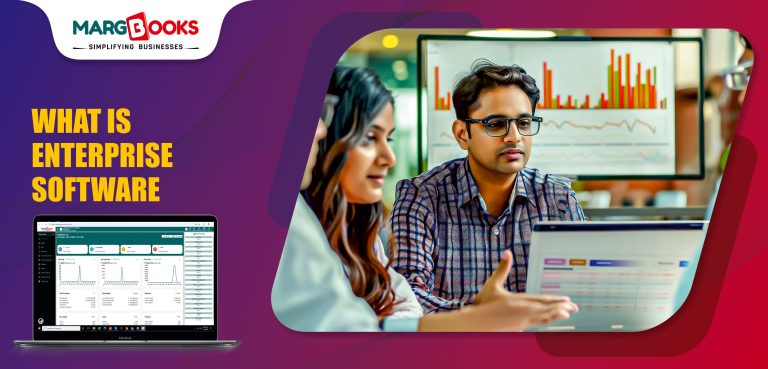New technological advancements have revolutionized the operational methods used by companies for business operations. Business survival depends on obtaining tools that elevate operational effectiveness and communication capabilities as well as structural simplification. The essential business tool that organizations utilize is enterprise software. The system enables businesses to streamline operations by executing automated work processes and handling resource allocation and better decision-making.
Companies can use appropriate software to decrease operational expenses while speeding up operations. Enterprise software describes software programs that support large businesses in their operations. This blog examines what enterprise software is, its core definition along with functionality and advantages as well as selection guidelines for the right software.
What is Enterprise Software?
Enterprise software represents a specific application development approach which enables the management of big business operations. This system enables firms to handle their essential departments including accounting, human resources, customer interactions and logistics management functions. Enterprise software design includes built-in scalability which enables perfect system integration between different departments.
The system combines diverse business operations into a single framework for maximizing data precision as well as operational speed. Modern organizational operations based on enterprise software systems help numerous sectors such as healthcare, retail, and manufacturing achieve workflow optimization along with productivity gains. To accomplish business targets, businesses must select appropriate software programs that will help them sustain market competition.
Features of Enterprise Software
The powerful elements in the software bring companies strong capabilities that boost operational effectiveness. Therefore, what is enterprise software? The features are as follows:
1. Scalability
The growth of businesses causes an expansion in their operational requirements. Enterprise software contains built-in capabilities to enlarge at the same rate as the business grows. The software maintains high performance standards when handling rising data levels and user numbers combined with increasing transaction volumes.
2. Integration Capabilities
The main benefit of choosing enterprise software lies in its compatibility with additional software systems. Our MargBooks software integrates different business sections, which creates effective information exchange that leads to better choices.
3. Advanced Security
Companies regard data protection as their principal organizational concern. Enterprise software implements multiple data defense elements through encryption technology, access rules, and compliance frameworks for sensitive database protection.
4. Automation & Workflow Management
Staff members can reduce human errors by applying automation to repetitive tasks, which also cuts down processing time. Enterprise software enables automated tasks that manage payroll together with invoicing and inventory processes, which results in increased efficiency levels.
Benefits of Enterprise Software
The implementation of the software creates multiple advantages for businesses. So what is enterprise software? The benefits are as follows:
1. Increased Efficiency
Through its application, the Enterprise software system decreases time-consuming manual work while improving operational process efficiency. Business operations benefit from employee attention on strategic duties while they no longer perform repetitive work.
2. Better Decision-Making
Businesses gain the ability to make well-informed decisions through their access to current analytics and data. MargBooks software analytics help business leaders create strategic plans by providing them with needed information.
3. Cost Savings
Computing operations and error reduction enable businesses to minimize operational expenses and labor costs simultaneously. The improved allocation of organization resources through enterprise software helps organizations lower their unnecessary costs.
4. Improved Collaboration
Teams function without interruption when they use integrated communication features. Employees distributed through various departments and sites have seamless access to share information which allows them to collaborate productively together.
How to Choose the Right Enterprise Software?
A business needs proper enterprise software selection to achieve success. Therefore, what is enterprise software? The key factors are as follows:
1. Business Needs & Goals
Your company must evaluate its needs before starting the software selection process. The software selection process begins with identifying business problems along with a verification of how the software matches your business goals.
2. Customization & Flexibility
Every business has unique needs. Such software should permit users to modify its features to match their existing workflows while allowing for modifications required by upcoming change needs.
3. User-Friendliness & Support
The selected software needs to provide a simple operation that works for personnel from any department. Review the availability of dependable customer support together with training materials that will help facilitate a smooth implementation process.
4. Security & Compliance
Data protection is crucial. Businesses should opt for software solutions with robust security features and complete adherence to industry regulations to protect their organizational information.
Conclusion
What is Enterprise software? Enterprise software is a transformative solution that businesses use to enhance efficiency and optimize their operations. Business’s resources improve their effectiveness through features that include automation alongside integration with other systems and enhanced security features.
A company must select MargBooks software by assessing its requirements regarding needs and scalability alongside security protocols. Businesses thrive in the evolving market when they spend their money on appropriate tools that boost productivity while minimizing expenses and maintaining market competitiveness.




